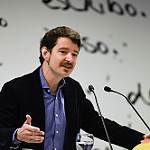What does it mean to be an ‘expert’ in the Web era?

We are delighted to extend an invitation to our next workshop which will bring together interested parties from Oxford and other organisations to critically analyse the tensions between traditional and new-modes of delivering university level education . When: Wednesday, May 28, 2014 – 11:00am to 4:00pm Where: Radcliffe Humanities, Seminar Room (The Oxford Research Centre in the Humanities). Framework:
In recent years many new ways of engaging with higher education online have been developed. Some of these educational initiatives known as Massive Open Online Courses (MOOCs), led by major universities such as Stanford, Harvard or MIT are generating a great deal of interest for a large volume of learners online (millions of users in some cases). Interestingly, MOOCs and other Open Educational Practices (OEP) are also becoming a good test bed for universities to experiment new pedagogical models; as well as new forms of assessing and certificating the knowledge and skills acquired by learners.
This phenomenon has already brought to the fore a number of questions around the role and purpose of traditional institutions in the context of the global adoption of ‘virtual’ and open forms of teaching. This in turn is creating a tension between the values of traditional forms of institutionally based knowledge and new forms of online learning.
Aim:
The event will offer the opportunity to analyze and better understand with different stakeholders, relevant dimensions of the future of higher education as a platform that can foster innovative educational practices and knowledge transfer.
The understanding of the future of higher education is increasingly tied to the Web via novel forms of knowledge generation and exchange. Particular attention will be given to understanding how traditional and novel forms of education, as well as non-traditional forms of certification, are generating a much more complex and diversified higher education horizon.
Methodology:
During this workshop, experts in higher education and technology will be engaging with different stakeholders such as social scientists, economists, policy experts, and other individuals to discuss to what extent the latest open educational practices are influencing new socio-economic realities.
A panel discussion will review and critique emerging learning opportunities and the value of new forms of knowledge creation, exploring how the Web influences our understanding of what it means to be an ‘expert’ and the manner in which universities and disciplines should respond to the new currency of the Web.
Thematic panels will be arranged to discuss: formal and informal continuous learning experiences; new forms of academic visibility; new means of knowledge recognition/certification; and open access and open educational practices.
Please click here for the programme
Booking:
Participation is free, but space is limited and registration is required. Please click here to register.
Convenors:
David White, researcher at Department for Continuing Education – University of Oxford
Cristobal Cobo, research fellow Oxford Internet Institute – University of Oxford
TORCH | The Oxford Research Centre in the Humanities
Humanities Division, University of Oxford, Radcliffe Humanities Building, Radcliffe Observatory Quarter, Woodstock Road, Oxford OX2 6GG, UK
Posted in Education and ICT on Mar 10, 2014




